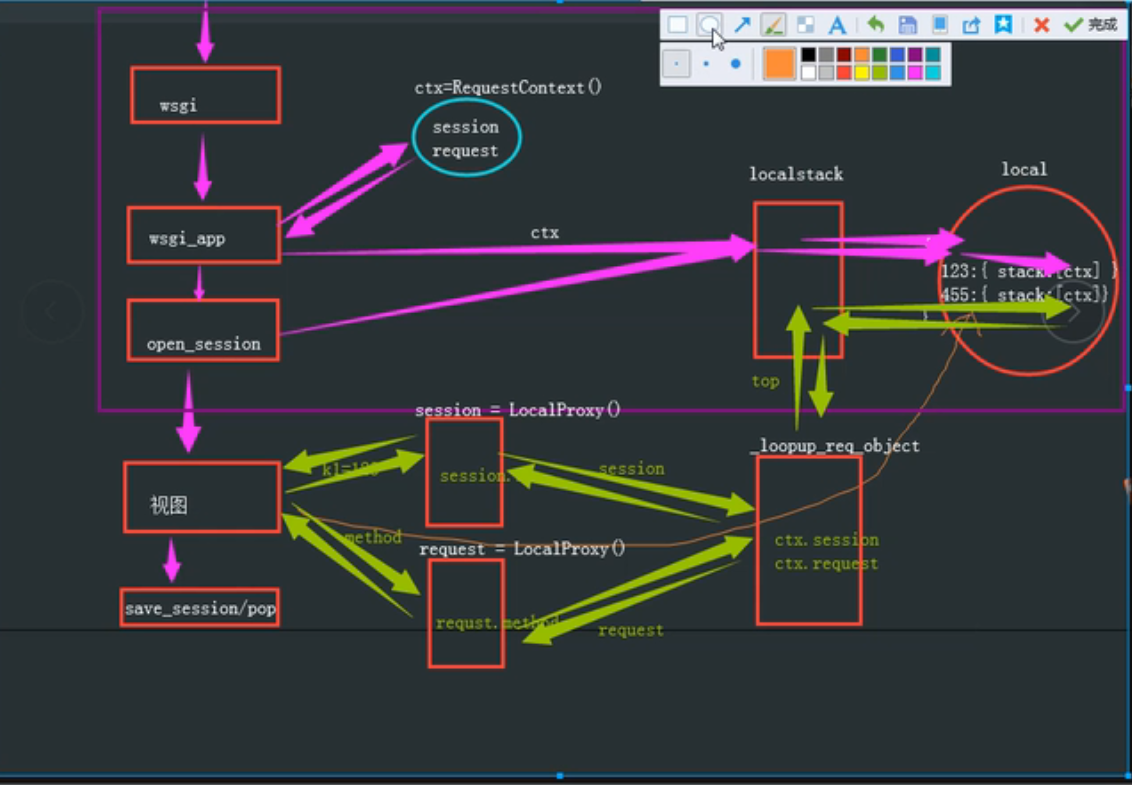1.上下文管理流程
- 流程图

"""
threading.local
上下文管理
"""
from flask import Flask, request, session
app = Flask(__name__)
app.__call__
@app.route("/index")
def index():
request.method
pass
if __name__ == '__main__':
app.run()
"""
1.用户请求一旦到来执行app.__call__方法
2.__call__方法
1.self.wsgi_app(environ, start_response)
2.ctx = self.request_context(environ) # 初始化request和session以及完成路由匹配
3.ctx.push() - >_request_ctx_stack.push(self) # 使用一个类似于threading.local容器存放ctx对象
4.给session赋值
5.response = self.full_dispatch_request() # 找试图函数
6.preprocess_request # 执行before_request装饰器
7.rv = self.dispatch_request() # 找试图函数执行代码
N.self.finalize_request(rv) # 执行after_request, 将session设置进到cookie
N+1.ctx.auto_pop(error) # 删除上线文
3.在试图函数中获取request.method以及session[key]="123", session[key1]是如何进行的?
1.request.method
request = LocalProxy(partial(_lookup_req_object, 'request'))
LocalProxy初始化了一个object.__setattr__(self, "_LocalProxy__local", local) == self.__local=local _LocalProxy__表示他是私有方法
request.method 执行LocalProxy的 __getattr__方法, 执行getattr(self._get_current_object(), name) name="method"
self._get_current_object() == self.__local() == _lookup_req_object('request') == ctx.request
此时getattr(ctx.request, "method") == request.method
2.session[key]="123" 以及 session[key1]与request是完全一样的
LocalProxy(partial(_lookup_req_object, 'session')) 经过request的流程我们发现其实他就是去ctx中取session对象
session[key]="123" 执行__setitem__方法 self._get_current_object()[key] = value
其中self._get_current_object()就是我们的session对象他是一个字典, 设置值
session[key1]执行__getitem__方法, getattr(self._get_current_object(), name) = session.get("key1")
4.flask中创建了几个LocalStack与local对象?
都是两个, 一个LocalStack创建一个local对象
5.flask中的g对象,范围是什么?
AppContext: 请求刚进来的时候创建了, 请求结束时销毁了
g 可以当做session使用么? 不可以, 以为每个请求来时创建, 请求结束时销毁了, 但是没有从cookie中取值放入g中因此它是一次性的
"""
2.全局插入变量
from flask import Flask, g
app = Flask(__name__)
app.config.from_object("settings.DevelopmentConfig")
@app.before_request
def bf():
g.x = 666
@app.route("/index1", methods=["POST", "GET"])
def index1():
g.x = 1
pass
@app.route("/index2", methods=["POST", "GET"])
def index2():
print(g.x)
return "index"
if __name__ == '__main__':
app.run()
``




【推荐】国内首个AI IDE,深度理解中文开发场景,立即下载体验Trae
【推荐】编程新体验,更懂你的AI,立即体验豆包MarsCode编程助手
【推荐】抖音旗下AI助手豆包,你的智能百科全书,全免费不限次数
【推荐】轻量又高性能的 SSH 工具 IShell:AI 加持,快人一步
· TypeScript + Deepseek 打造卜卦网站:技术与玄学的结合
· Manus的开源复刻OpenManus初探
· AI 智能体引爆开源社区「GitHub 热点速览」
· 三行代码完成国际化适配,妙~啊~
· .NET Core 中如何实现缓存的预热?
2020-06-02 54.python发送邮件
2020-06-02 53.traceback报错处理